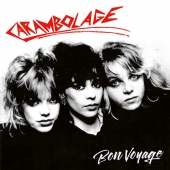
Carambolage
Bon Voyage
Label: Tapete
Genre: 80s Wave / Rock / Pop / Punk
Availability
- LP €26.99 Dispatched within 5-10 working days
After four successful years of extensive touring, new perspectives presented themselves to Carambolage. Having outgrown the somewhat languid Scherben scene and label life at David Volksmund Produktion, the trio upped sticks and headed for Berlin, curious to see what the big city had to offer, namely a close-up view of the pop business. Manne Praeker, former Spliff bass player and Nina Hagen’s producer, offered to produce their third record, anticipating a shot at success with a major label. Bon Voyage was recorded in 1984 in Praeker’s Mad-Mix studio in Berlin with various guest musicians. Even the pop mag Bravo took note, featuring the punkish North Frisians in a home story. Alas, any aspirations of becoming stars quickly dissipated during the recording process as aesthetic differences came to the fore. In one corner, Britta and Angie were determined to follow the DIY principles of the two preceding albums. In the opposite corner, Manne Praeker and Elfie felt compelled to introduce a stronger element of professionalism and Praeker increasingly weighed into the creative process. »You might say our story practically came to an end with a collision**, just to match our name,« Britta Neander recalled in an interview with Tine Plesch. We’re happy to report that the girls renewed their friendship after a while.
The third record is well worth a listen, a divergent coda to the band’s history. Bon Voyage spent 34 years under lock and key before the FUEGO label released a digital version in the year 2019.
Carambolage never set out to be a »girl band« but they were one of the first German new wave bands whose members were all female. The punk alliance comprising Britta Neander, Elfie-Esther Steitz and Angie Olbrich emerged organically from the environs of Ton Steine Scherben, friends united by a common interest in musical experimentation.
Britta’s passion for the drums ignited in 1974 in Fresenhagen, North Frisia, where she played percussion for Ton Steine Scherben. What she really wanted was her own band, so she looked around for kindred spirits. R.P.S. Lanrue’s little sister Elfie-Esther was an obvious candidate. Angie, a child from the streets who joined the commune in 1972, completed the line-up. If you think that they simply followed in the Scherben slipstream, you’d be wrong: Carambolage surfed on their very own »North Frisian Wave« - an epithet dreamed up for their distinctive sound. Shortly before her death in 2004, Britta was interviewed by music journalist Tine Plesch and described how the »girls gang« gave them the freedom to experiment and come up with »these really funny, filthy lyrics«. There is a childish, subversive charm to the songs, emboldened by the realization that »we could fool around as much as we wanted.«
Their sound was not the only aspect of the group which resulted from experimental tinkering. Keen to have their own space, away from a male-dominated environment, they used cardboard and carpets to build their own practice room inside an old grain silo. Strictly out of reach of the Scherben. It’s fair to say that Carambolage helped to shape the DIY approach which the Riot Grrrls of the 1990s would emulate.
Forty years later, it’s still mostly men standing on festival stages, but the Carambolage story ought not be consigned to the shelves marked nostalgia. On the contrary, it is a thread which most definitely needs to be picked up. As Julie Miess, who later joined Christiane Rösinger and Britta in the Lassie Singers offshoot Britta (the band) noted so succinctly in her Carambolage text (›Damaged Goods‹, Ventil Verlag):
»Role models every seven-year-old girl should have!«
